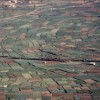Abstract
El cultivo en asocio (o cultivo intercalado) es una práctica en donde se siembran diversos cultivos en un mismo campo. Adicionalmente plantas que no son cultivos, tales como las malezas, cultivos rastreros o de cobertura, así como plantas del hábitat, se pueden combinar en el espacio y tiempo para influir en el número de plagas o artrópodos benéficos en un cultivo principal.
This 7-page fact sheet was written by Hugh Smith and Oscar Liburd. Translated by Ana Lucrecia MacVean, and published by the UF Department of Entomology and Nematology, June 2012.
ENY-862-S/IN932: Cultivos en asocio, diversidad de cultivos y manejo integrado de plagas (ufl.edu)
References
Andow, D. 1991. Vegetational diversity and arthropod population response. Annual Review of Entomology 36: 561-86. https://doi.org/10.1146/annurev.en.36.010191.003021
Bugg, R. L., W. E. Chaney, R. G. Colfer, J. A. Cannon y H. A. Smith. 2008. Flower flies (Diptera: Syrphidae) and other important allies in controlling pests of California vegetable crops. University of California, Division of Agriculture and Natural Resources, Publication 8285. University of California Press, Davis, CA.
Collins, K. L., N. D. Boatman, A. Wilcox, J. M. Holland y K. Chaney. 2002. Influence of beetle banks on cereal aphid predation in winter wheat. Agriculture, Ecosystems and Environment 93: 337-350. https://doi.org/10.1016/S0167-8809(01)00340-1
Frank, D.L. y O.E. Liburd. 2005. Effects of living and synthetic mulch on the population dynamics of whiteflies and aphids, their associated natural enemies and insect-transmitted plant diseases in zucchini. Environmental Entomology 34: 857-865. https://doi.org/10.1603/0046-225X-34.4.857
Funderburk, J., S. Reitz, P. Stansly, S. Olson, D. Sui, G. McAvoy, A. Whidden, O. Demirozer, G. Nuessly y N. Leppla. 2011. Managing thrips in pepper and eggplant. University of Florida IFAS Extension Publication ENY 658. 11 pp. https://doi.org/10.32473/edis-in895-2011
Hooks, C. R. R. y M. W. Johnson. 2003. Impact of agricultural diversification on the insect community of cruciferous crops. Crop Protection 22: 223-238. https://doi.org/10.1016/S0261-2194(02)00172-2
Jervis, M. A., G. E. Heimpel. Phytophagy In Insects as natural enemies; Jervis, M. A. Ed., Springer, Netherlands, 525-550.
Mitchell, E. R., G. Hu y D. Johanowicz. 2000. Management of diamondback moth in cabbage using collard as a trap crop. HortScience 35: 875-879. https://doi.org/10.21273/HORTSCI.35.5.875
Nyoike, T. W. y O. E. Liburd. 2010. Effect of living (buckwheat) and UV reflective mulches with and without imidacloprid on whiteflies, aphids and marketable yields of zucchini squash. International Journal of Pest Management 56: 31-39. https://doi.org/10.1080/09670870902991815
Osborne, L. S. y J. E. Barrett. 2005. You can bank on it: banker plants can be used to rear natural enemies to help control greenhouse pests. Ornamental Outlook (September) pp. 26-27 (http://mrec.ifas.ufl.edu/lso/banker/Documents/BANKERFoliage.pdf).
Patt, J. M., G. C. Hamilton y J. H. Lashomb. 1997. Impact of strip-insectary intercropping with flowers on conservation biological control of the Colorado potato beetle. Advances in Horticultural Science 11: 175-181.
Pimentel, D. 1961. Species diversity and insect population outbreaks. Annals of the Entomological Society of America 54: 76-86. https://doi.org/10.1093/aesa/54.1.76
Portman, S. L., J. H. Frank, R. McSorley y N. C. Leppla. 2010. Nectar-seeking and host-seeking by Larra bicolor, a parasitoid of Scapteriscus mole crickets. Environmental Entomology 39: 939-943. https://doi.org/10.1603/EN09268
Root, R. 1973. Organization of a plant-arthropod association in simple and diverse habitats. The fauna of collards (Brassica oleracea). Ecological Monographs 43: 95-124. https://doi.org/10.2307/1942161
Smith, H. A. y R. McSorley. 2000. Potential of field corn as a barrier crop and eggplant as a trap crop for management of Bemisia argentifolii on common bean in north Florida. Florida Entomologist. 83: 145 -158. https://doi.org/10.2307/3496150
Smith, H. A., R. L. Koenig, H. J. McAuslane y R. McSorley. 2000. Effect of silver reflective mulch and a summer squash trap crop on densities of immature Bemisia argentifolii on organic bean. Journal of Economic Entomology 93: 726-731. https://doi.org/10.1603/0022-0493-93.3.726
Smith, H. A., R. McSorley y J. A. Sierra Izaguirre. 2001. The effect of intercropping common bean with poor hosts and nonhosts on numbers of immature whiteflies (Homoptera: Aleyrodidae) in the Salamá valley, Guatemala. Environmental Entomology 30: 89-100. https://doi.org/10.1603/0046-225X-30.1.89
UC IPM website Strawberry Lygus Bug. http://www.ipm.ucdavis.edu/PMG/r734300111.html. Consulted Dec 14 2011.
Zhao, J. Z., G. S. Ayers, E. J. Grafius y F. W. Stehr. 1992. Effects of neighboring nectar-producing plants on populations of pest Lepidoptera and their parasitoids in broccoli plantings. Great Lakes Entomologist 24: 253-258.

